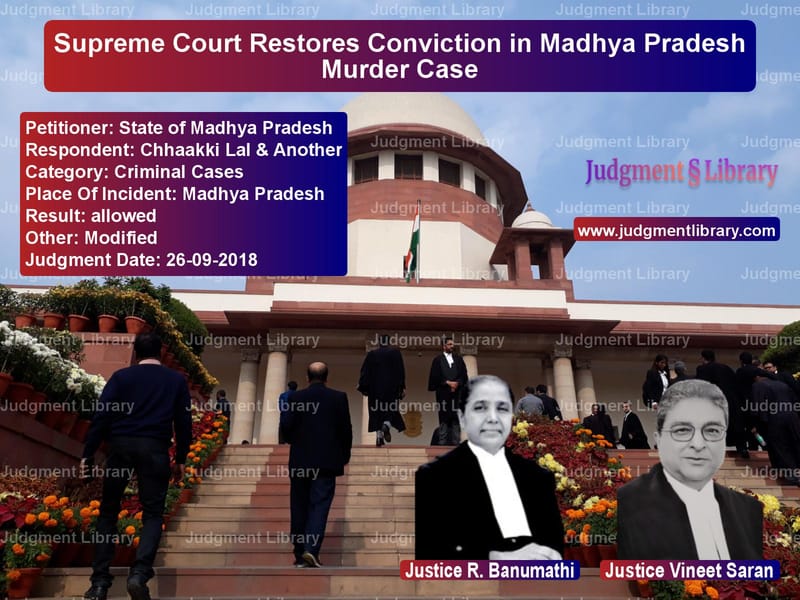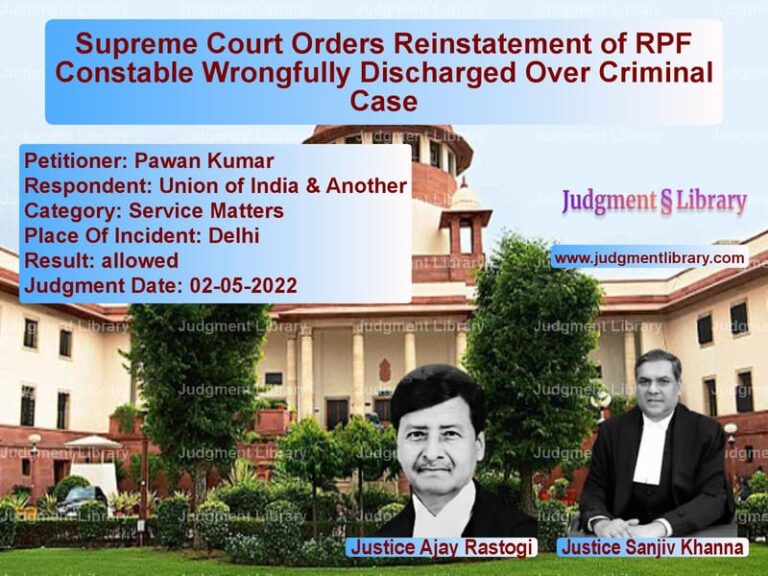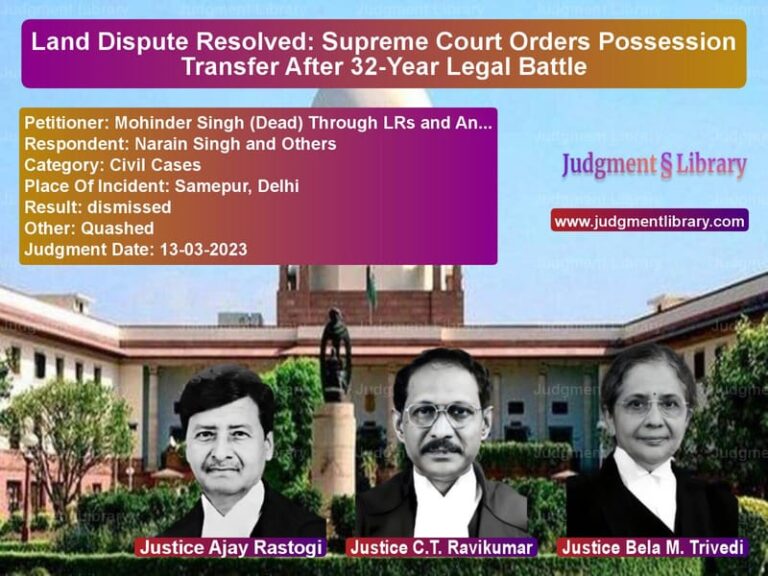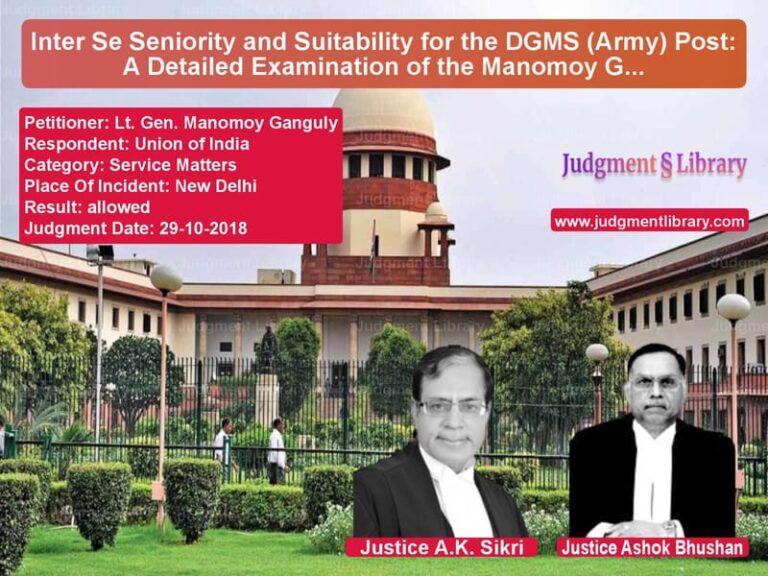Supreme Court Restores Conviction in Madhya Pradesh Murder Case
The Supreme Court, in its judgment dated September 26, 2018, in the case of State of Madhya Pradesh vs. Chhaakki Lal & Another, overturned the acquittal of the accused by the Madhya Pradesh High Court and restored their conviction for the brutal murder of four individuals, including a child. The Court upheld the trial court’s finding but reduced the death penalty to life imprisonment.
Background of the Case
The case arose from an incident on February 20, 2006, when Kesar Bai (PW-1), along with her daughter-in-law Phoolwati and three-year-old grandson Rinku, was heading towards the fields. Ahead of them were Ganeshi Bai (Kesar Bai’s daughter) and Ganga Singh (a relative). As they reached a public path near Madhawala Danda, they were attacked by the accused, Chhaakki Lal and his son Akhilesh, who were armed with guns.
Sequence of the Crime
- Both accused fired multiple gunshots at Ganeshi Bai and Ganga Singh, killing them instantly.
- They then turned towards Phoolwati and fired at her abdomen.
- Akhilesh fired at Rinku, and Chhaakki Lal threw the child to the ground and jumped on his abdomen, causing his intestines to spill out.
- Kesar Bai (PW-1) confronted them, but Chhaakki Lal stated, “We won’t kill you now. You will die seeing this.”
A case was registered under Section 302 IPC (murder) read with Section 34 IPC and relevant provisions of the Arms Act.
Trial Court Verdict
The trial court found the accused guilty based on the eye-witness testimony of Kesar Bai (PW-1) and forensic evidence. It categorized the crime as a ‘rarest of rare cases’ and sentenced both accused to death.
High Court Acquittal
On appeal, the Madhya Pradesh High Court set aside the conviction, citing inconsistencies in the testimony of Kesar Bai (PW-1). The High Court observed:
- Kesar Bai’s (PW-1) testimony contained contradictions.
- The FIR was filed after a delay.
- Ballistic reports were submitted late, raising doubts about forensic credibility.
- The accused’s defense that the murders were committed by dacoits had merit.
Based on these findings, the High Court acquitted the accused.
Supreme Court’s Observations
The Supreme Court, after reviewing the evidence, strongly disagreed with the High Court’s findings.
1. Credibility of the Sole Eye-Witness
The Court reaffirmed that a conviction can be based on a sole witness’s testimony if it is credible. It held:
“Merely because Kesar Bai (PW-1) is related to the victims does not make her testimony unreliable. Her presence at the scene was natural.”
2. Minor Contradictions Do Not Affect the Prosecution Case
The Court noted that minor discrepancies are expected in testimony:
“A witness cannot recall every detail with photographic memory. Minor contradictions do not weaken the core prosecution case.”
3. FIR Delay Was Justified
The delay in registering the FIR was found reasonable, given the trauma of the witness:
“A seventy-year-old woman, who lost four family members, cannot be expected to immediately travel 10 km to file an FIR.”
4. Ballistic Evidence Supported Prosecution
The Court found that forensic reports confirmed that the bullets were fired from weapons recovered from the accused.
5. Defense of Dacoits Involvement Was Baseless
The Court rejected the claim that dacoits were responsible, as there was no evidence supporting this theory.
Final Judgment
- The Supreme Court set aside the High Court’s acquittal.
- It restored the trial court’s conviction of the accused under Section 302 IPC.
- The death penalty was commuted to life imprisonment, considering the passage of time and the fact that one of the accused, Akhilesh, had passed away.
- Chhaakki Lal was directed to surrender within a week or be taken into custody.
Implications of the Judgment
This ruling has significant legal implications:
1. Importance of Sole Eye-Witness Testimony
The ruling establishes that a single credible witness can be the basis for conviction.
2. Judicial Duty in Reviewing Acquittals
The Supreme Court emphasized that a miscarriage of justice occurs not only when the innocent are convicted but also when the guilty are acquitted.
3. Clarity on FIR Delays
The judgment reaffirms that reasonable FIR delays should not be held against the prosecution.
4. No Room for Unfounded Theories
The Court dismissed unsupported alternative theories, reinforcing that courts must rely on evidence.
Conclusion
The Supreme Court’s decision in State of Madhya Pradesh vs. Chhaakki Lal & Another is a landmark ruling reaffirming the credibility of eye-witness testimony, emphasizing due process in murder trials, and ensuring that justice prevails over technicalities. By restoring the conviction, the Court upheld the rule of law and fairness in criminal justice.
Petitioner Name: State of Madhya Pradesh.Respondent Name: Chhaakki Lal & Another.Judgment By: Justice R. Banumathi, Justice Vineet Saran.Place Of Incident: Madhya Pradesh.Judgment Date: 26-09-2018.
Don’t miss out on the full details! Download the complete judgment in PDF format below and gain valuable insights instantly!
Download Judgment: State of Madhya Prad vs Chhaakki Lal & Anoth Supreme Court of India Judgment Dated 26-09-2018.pdf
Direct Downlaod Judgment: Direct downlaod this Judgment
See all petitions in Murder Cases
See all petitions in Bail and Anticipatory Bail
See all petitions in Custodial Deaths and Police Misconduct
See all petitions in Judgment by R. Banumathi
See all petitions in Judgment by Vineet Saran
See all petitions in allowed
See all petitions in Modified
See all petitions in supreme court of India judgments September 2018
See all petitions in 2018 judgments
See all posts in Criminal Cases Category
See all allowed petitions in Criminal Cases Category
See all Dismissed petitions in Criminal Cases Category
See all partially allowed petitions in Criminal Cases Category







